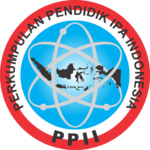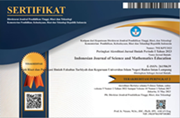The Influence of Problem-Based Learning-Flipped Classroom (PBL-FC) on Mathematical Argumentation Skills
Abstract
Keywords
Full Text:
PDFReferences
R. B. A. Soekisno, “Pembelajaran Berbasis Masalah Untuk Meningkatkan Kemampuan Argumentasi Matematis Mahasiswa,” Infin. J., vol. IV, no. 2, pp. 120-139, 2015.
A. R. As’ari, D. Kurniati, and Subanji, “Teachers expectation of students’ thinking processes in written works: A survey of teachers’ readiness in making thinking visible,” J. Math. Educ., vol. X, no. 3, pp. 409–424, 2019.
R. Novita and M. Putra, “Using task like Pisa’s problem to support student’s,” J. Math. Educ., vol. VII, no. 1, pp. 31–42, 2016.
E. Kazemi and H. Ghousseini, “Supporting Teacher Learning about Argumentation through Adaptive, School-Based Professional Development,” ZDM Math. Educ., vol. LIII, no. 1, pp. 435–448, 2021.
E. Yurt, “21st-century Skills as Predictors of Pre-Service Teachers’ Professional Qualifications: A Cross-Sectional Study,” Int. J. Educ. Math. Sci. Technol., vol. XI, no. 5, pp. 1328–1345, 2023.
N. S. Mahdiyyah and S. Susanah, “Analisis Argumen Matematika Siswa SMA Ditinjau dari Gaya Kognitif Visualizer-Verbalizer,” MATHEdunesa, vol. XI, no. 1, pp. 80–96, 2022.
H. Kartika, M. T. Budiarto, Y. Fuad, and E. Bonyah, “Bibliometrics Analysis of Research on Argumentation in Mathematics Education,” Int. J. Educ. Math. Sci. Technol., vol. XI, no. 5, pp. 1346–1365, 2023.
O. Molina, V. Font, and L. R. Pino-Fan, “Estructura y dinámica de argumentos analógicos, abductivos y deductivos: Un curso de geometría del espacio como contexto de reflexión [Structure and dynamic of analogical, abductive and deductive arguments: A course on solid geometry as a context for refl,” Enseñanza las Ciencias [Science Educ., vol. X, no. 1, pp. 93–116, 2019.
E. Kazemi, H. Ghousseini, E. Cordero-Siy, S. Prough, E. McVicar, and A. F. Resnick, “Supporting teacher learning about argumentation through adaptive, school-based professional development,” ZDM Math. Educ., vol. LIII, pp. 435–448, 2021.
Ó. Molina, V. Font, and L. R. Pino-Fan, “Estructura y dinámica de argumentos analógicos, abductivos y deductivos: un curso de geometría del espacio como contexto de reflexión,” Enseñanza las Ciencias [Science Educ., vol. XXXVII, no. 1, pp. 93–116, 2019.
J. A. T. Uribe and W. F. Castro, “Condiciones que activan la argumentación del profesor de matemáticas durante la discusión de tareas en clase [Conditions that activate the argumentation of the mathematics teacher in classroom].,” Rev. Chil. Educ. Matemática, vol. XII, no. 1, pp. 35–44, 2020.
W. F. Castro, “Mathematics teacher argumentation in a didactic perspective,” Jurnal Eurasia Pendidikan Matematika, vol. XI, no. 9, pp. 1-11, 2023.
M. Evagorou, E. Papanastasiou, and M. Vrikki, “What do we really know about students’ written arguments? Evaluating written argumentation skills,” Eur. J. Sci. Math. Educ., vol. XI, no. 4, pp. 615–634, 2023.
E. Demiray, M. Işıksal-Bostan, and E. Saygı, “How argumentation relates to formal proof process in geometry,” Int. Electron. J. Math. Educ., vol. XVIII, no. 3, pp. 1-16, 2023.
A. J. Stylianides, “Secondary students’ proof constructions in mathematics: The role of written versus oral mode of argument representation,” Rev. Educ., vol. VII, no. 1, pp. 156–182, 2019.
E. Kazemi, H. Ghousseini, E. Cordero-Siy, S. Prough, E. McVicar, and A. F. Resnick, “Supporting Teacher Learning about Argumentation through Adaptive, School-Based Professional Development Kazemi, Elham; Ghousseini, Hala; Cord,” ZDM Math. Educ., vol. LIII, no. 2, pp. 435–448, 2021.
M. Ayalon and R. Hershkowitz, “Mathematics teachers’ attention to potential classroom situations of argumentation,” J. Math. Behav., vol. XLIX, pp. 163–173, 2018.
F. Cardetti and S. LeMay, “Argumentation: Building students’ capacity for reasoning essential to learning mathematics and sciences,” PRIMUS, vol. XXIX, no. 8, pp. 775–798, 2019.
B. Sriraman and Kristin Umland, Argumentation in Mathematics Education. Cham : Springer eBooks, 2020.
K. Wilkie and M. Ayalon, “Learning to argue while arguing to learn: Students’ emotional experiences during argumentation for graphing real-life functions,” Eurasia J. Math. Sci. Technol. Educ., vol. XIX, no. 8, pp. 1-20, 2023.
N. Handayani and F. Hidayat, “Hubungan Kemandirian terhadap Hasil Belajar Siswa Mata Pelajaran Matematika di kelas X SMK Kota Cimahi,” J. Educ., vol. I, no. 2, pp. 1–8, 2019.
A. Maksum and I. Lestari, “Analisis Profil Kemandirian Belajar Mahasiswa Di Perguruan Tinggi,” Param. J. Pendidik. Univ. Negeri Jakarta, vol. XXXII, no. 1, pp. 75–86, 2020.
C. Santos and A. Barbosa, “The Impact of Written Feedback in Geometry Problem Solving through a Gallery Walk,” Int. J. Educ. Math. Sci. Technol., vol. XI, no. 5, pp. 1131–1153, 2023.
M. Moallem, W. Hung, and N. Dabbagh, The Wiley Handbook of Problem‐Based Learning 2019. USA: Wiley BlackWell, 2019.
SC dos Santos, "PBL-SEE: An Authentic Assessment Model for PBL-Based Software Engineering Education," IEEE Trans. Educ., vol. LX, no. 2, pp. 120–126, 2017.
W. Hung, M. Moallem, and N. Dabbagh, The Wiley Handbook of Problem Based Learning. India : Wiley Black Well, 2019.
M. E. A. Saputra and M. Mujib, “Efektivitas Model Flipped Classroom Menggunakan Video Pembelajaran Matematika terhadap Pemahaman Konsep,” Desimal J. Mat., vol. I, no. 2, pp. 173-179, 2018.
H. N. Damayanti and S. Sutama, “Efektivitas Flipped Classroom Terhadap Sikap Dan Ketrampilan Belajar Matematika Di Smk,” Manaj. Pendidik., vol. XI, no. 1, pp. 2-7, 2016.
W. N. Yanuarto, A. Jaelani, and J. Purwanto, “Flipped Classroom Model: Empowering Digital Literacy for Mathematics Learning in Society 5.0,” Indones. J. Sci. Math. Educ., vol. IV, no. 2, pp. 158–171, 2021.
V. S. Andrini, H. Pratama, and T. W. Maduretno, “The effect of flipped classroom and project based learning model on student’s critical thinking ability,” J. Phys. Conf. Ser., vol. MCLXXI, no. 1, pp. 1-9, 2019.
V. S. Andrini, H. Pratama, and T. W. Maduretno, “The effect of flipped classroom and project based learning model on student’s critical thinking ability,” in Journal of Physics: Conference Series, vol. MCLXXI, no. 1, pp. 1-9, 2019.
M. Paristiowati, U. Cahyana, and B. I. S. Bulan, “Implementation of problem-based learning–flipped classroom model in chemistry and its effect on scientific literacy,” Univers. J. Educ. Res., vol. VII, no. 9, pp. 1-5, 2019.
R. Rahayu and D. R. Indriyanti, “An Ethnosains Based Project Based Learning Model with Flipped Classroom on Creative Thinking Skills,” J. Penelit. Pendidik. IPA, vol. IX, no. 8, pp. 348–355, 2023.
M. Rusdi, Penelitian Perlakuan Kependidikan: Perpaduan Penelitian Desain, Penelitian Tindakan dan Penelitian Eksperimen dalam Permasalahan Kependidikan. Depok: PT. Raja Grafindo Persada, 2020.
M. Yusuf, “Investigating relationship between self-efficacy, achievement motivation, and self-regulated learning strategies of undergraduate Students: A study of integrated motivational models,” Procedia - Soc. Behav. Sci., vol. XV, no. 1, pp. 2614–2617, 2011.
S. Velayutham, “Influence of Psychosocial Classroom Environment on Students’ Motivation and Self-Regulation in Science Learning: A Structural Equation Modeling Approach,” Res. Sci. Educ., vol. XLIII, no. 1, pp. 507-527, 2012.
B. B. Schwarz and M. J. Baker, Dialogue: Argumentation and Education: History, Theory and Practice. Cambridge : Cambridge University Press, 2017.
H. Yanti, Zaenuri, and Walid, “Kemandirian Belajar Siswa Pada Mata Pelajaran Matematika di Masa Pandemi Covid-19,” Pros. Semin. Nas. Pascasarj. UNNES, vol. III, no. 1, pp. 146–149, 2020.
A. Nurhafsari, “Kemandirian Belajar Matematika Siswa dalam Pembelajaran Kooperatif dengan Aktivitas Quick on The Draw,” GAUSS J. Pendidik. Mat., vol. I, no. 2, pp. 97–107, 2019.
R. N. Fadila, T. A. Nadiroh, R. Juliana, P. Z. H. Zulfa, and I. Ibrahim, “Kemandirian Belajar Secara Daring Sebagai Prediktor Hasil Belajar Mahasiswa Pendidikan Matematika UIN Sunan Kalijaga,” J. Cendekia J. Pendidik. Mat., vol. V, no. 2, pp. 880–891, 2021.
N. R. Alsalhi and S. S. A.-Q. Eltahir, Mohd. Elmagzou, “The effect of blended learning on the achievement of ninth grade students in science and their attitudes towards its use,” Heliyon, vol. V, no. 9, pp. 1-10, 2019.
D. R. Hidayat, A. Rohaya, F. Nadine, and H. Ramadhan, “Kemandirian Belajar peserta didik dalam pembelajaran daring pada Masa pandemi Covid-19,” Perspekt. Ilmu Pendidik., vol. XXXIV, no. 2, pp. 147–154, 2020.
M. G. Ranti, I. Budiarti, and B. N. Trisna, “Pengaruh Kemandirian Belajar (Self Regulated Learning) Terhadap Hasil Belajar Mahasiswa Pada Mata Kuliah Logika Komputer,” Pros. Semin. Nas. Pendidik. PGRI, vol. LXXV, no. 83, pp. 858–861, 2017.
DOI: http://dx.doi.org/10.24042/ijsme.v6i3.18458
Refbacks
- There are currently no refbacks.
Copyright (c) 2023 Unit Riset dan Publikasi Ilmiah FTK UIN Raden Intan Lampung

This work is licensed under a Creative Commons Attribution-ShareAlike 4.0 International License.

Indonesian Journal of Science and Mathematics Education is licensed under a Creative Commons Attribution-ShareAlike 4.0 International License.




